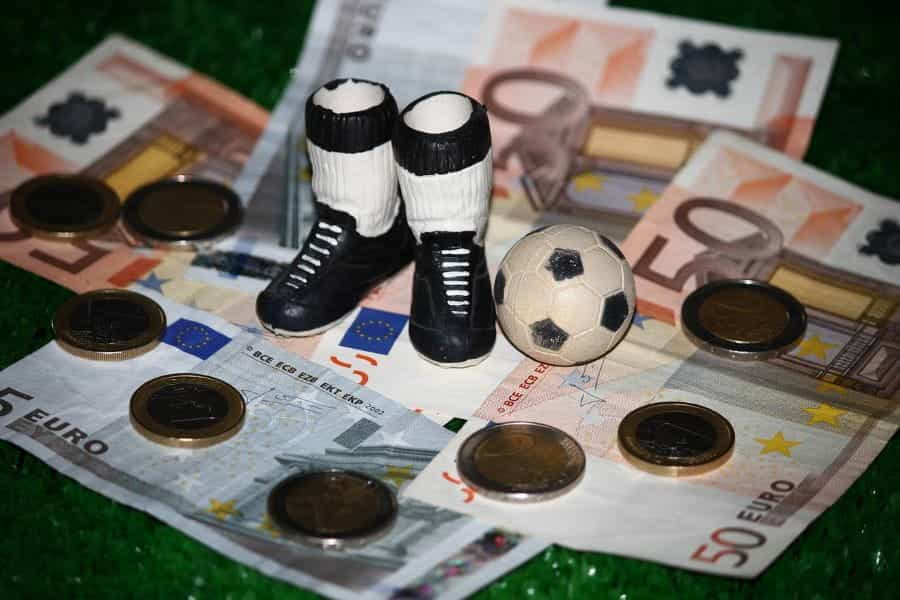European Football Faces Financial Uncertainty
With much of European football set to resume in the coming weeks following the pause on the season due to the Covid-19 pandemic, nearly all clubs will suffer financial difficulties. Not only will clubs lose income playing behind closed doors but the advisory Klynveld Peat Marwick Goerdeler (KPMG) estimates a €6.6 billion drop in the value of players if the current season is finished behind closed doors.

With the breakout of the Covid-19 pandemic affecting all corners of society, football is no exception. All teams, rich and poor will be financially hit by this pandemic and it could even cause the liquidation of many clubs. ©DS-Foto/Pixabay
Financial Problems for Clubs
Poorer clubs are predicted to be hit the hardest with one football finance expert saying that it is because bigger clubs will have more cash in the bank, during these times. Inconceivable amounts of money are spent by the top European leagues every year, and this year was predicted to be no different, however, the Covid-19 pandemic will cause dramatic changes in the way these football clubs carry out negotiations.
With the transfer window set to open on June 10th, clubs will be looking to take a much more considered approach to the way they spend their money. Teams will now have to be certain about a player before signing them, not being able to afford taking risks on players that are not 100% right for the team.
Smaller clubs will be preferentially seeking cheaper loan deals as opposed to buying players outright, with longer 2-year loans seeming the best option. The fall in the value of players will also hit smaller teams hard.
Many of these clubs will have no option but to sell their star players at a greatly reduced price just to keep the club alive and many bigger clubs have seen this coming. Manchester United manager Ole Gunnar Solskjaer hinted in April that the club will be looking to get cheap deals from the smaller clubs financially affected by Covid-19.
Other clubs will fare a lot better during this time, however. Clubs that restrict their transfer budgets and direct more funds towards youth development will be in a much better position than some of their financially frivolous rivals.
Current Eredivisie champions AFC Ajax is one of these clubs. For many years they have built their club on the philosophy of youth development, spending as little money as possible on bringing players in and instead investing money in their academy players. This will be the approach many teams will now be looking to adopt in these desperate times to ensure their survival as a football club.
The clubs that will also be hit the hardest are the ones that have a high percentage of their turnover from matchday income. As games will be played behind closed doors for the foreseeable future, these clubs risk losing vast sums of money.
Rangers have the highest percentage (67%) dependency on matchday income while Porto (45%) and Ajax (29%) also rely heavily on this cash flow. These clubs face further worries as although it has been already offered, it is unknown whether fans will renew their season tickets for next season.
There is no certainty of how much longer games will be required to stay behind closed doors and therefore how many games they will get to watch throughout the season. This adds more financial worries to many clubs across Europe and the rest of the world.
A Financial Revolution in Football?
Many people are calling this to be the turning point in football’s extortionate finances, saying that it’s time for the industry to take a step back and take a serious look at the vast amounts of money that circulates within the sport.
While much of the general public are losing their jobs and just scraping by in these difficult times, it would seem extremely distasteful for clubs to be spending ludicrous sums of money to buy a player. This will perhaps prompt clubs into thinking twice before spending these sums of money and potentially push the sport towards a more modest business model.
This is an idea shared by the Bayern Munich president. He said that in the coming years it will not be possible to spend the kind of money they have been in recent years, going further to say that he thinks this will dramatically change how football is run for at least the next few years.
There is another issue that arises from this situation. Although there could be a dramatic fall is the spending of football clubs, this is predicted to only amplify the financial discrepancies between Europe’s leading clubs and the rest.
Already in 2018, 75% of the revenue generated by top European leagues was from Europe’s top five leagues (Italy: Serie A, Spain: La Liga, Germany: Bundesliga, France: Ligue 1 and England: Premier league) and 49% from just 30 teams. With smaller clubs having to do whatever they can financially to stay alive, selling star players at uncompetitive prices, this will only widen the gap between the richest football clubs and the rest.
Football in Europe is gradually returning after its suspension caused by the spread of Covid-19. Most notably, German football was the first of the major leagues to return. The resumption of the competition did not come without hiccups, however. Players from Dynamo Dresden tested positive for the virus mere days before the football was due to return in the country.
The league resumed nevertheless, and the other big leagues on the continent are due to follow suit in the coming weeks. The Serie A in Italy, Ligue 1 in France and the Premier League in Britain are all aiming to follow in the footsteps of the Bundesliga and return to action and find an eventual winner.



